Feature
Signs to Freedom
Maameyaa Asiamah finds her place in Hands of Fire, Cru®’s campus ministry for Deaf students, to worship God as the person he made her to be.
March 2022
Ben Bennett, a Cru® staff member who works with Resolution Movement, skates into action while reaching out to Generation Z.
Cameron Crush smiled as he pulled off his headphones. The 19-year-old college student from Queensland, Australia, just finished listening to a podcast by Ben Bennett, director of Resolution Movement, an initiative of Cru®.
Cameron is a part of Generation Z, which includes individuals born in the late 1990s and early 2000s, according to Barna Research. He saw Resolution Movement on Instagram, TikTok and Facebook, and he wanted the support it provides for his generation to thrive.
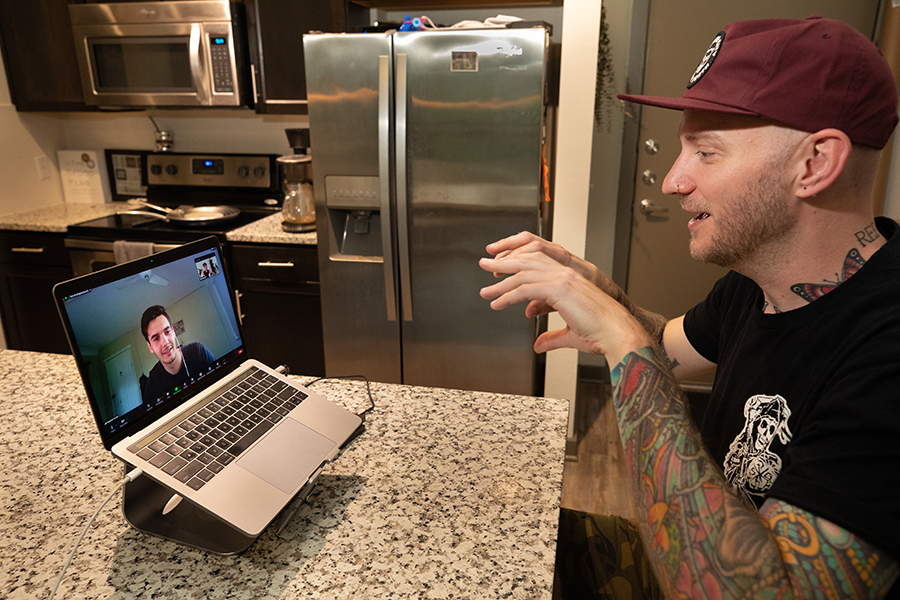
Cameron Crush, an Australian Generation Zer, gets information about Resolution Movement on a Zoom call with Ben.
Cameron struggled with pornography for five years. And although he had already recovered from this addiction and a gaming addiction, he recognized the value in learning how to have continued freedom.
Cameron Crush shares how podcast and video content from Resolution Movement, along with their social media presence, encourages him.
He liked the holistic approach of Resolution Movement, a ministry that gets to the heart of problems faced because of unmet longings — such as safety, acceptance, affirmation of feelings, and attention — which can lead to addictive behavior. He found that Resolution Movement uses biblical truth and brain science to address longings that need to be met in Jesus and healthy relationships with others.
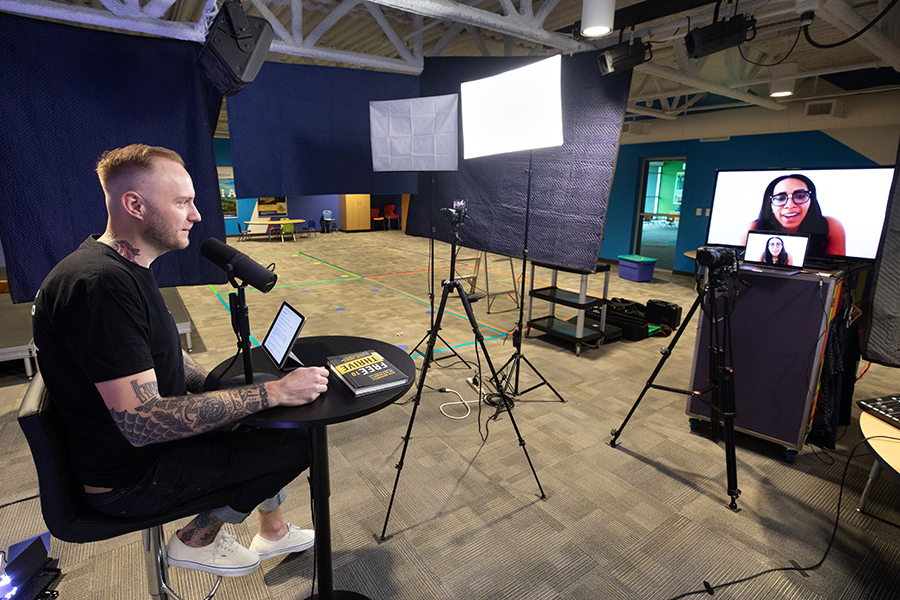
For one of his podcasts at the studio, Ben chats online with Toni Collier, speaker, author and founder of Broken Crayons Still Color.
Cameron’s motivation from Ben’s podcast resulted in him wanting to help others, like the youth group he works with in his church, learn about these resources. Cameron desires to lead a Resolution Movement video study for young people — particularly his own generation.

Ben Bennett plays a game called Fishbowl with friends from church at a friend’s home.
He wants them to experience what he has experienced. He has another goal, too: Spread the word to church leaders. Ben has been helping Cameron get started.
Ben’s story is similar to Cameron’s, although Ben is a millennial. One generation before Gen Z, millennials account for individuals born between 1981 and 1996. Ben also grew up in a Christian home but became addicted to pornography at age 12.
Ben’s emotional and relational life felt disconnected from his spiritual life. He tried to grow in his relationship with God, but this had little impact on his emotional wounds and the anger, anxiety and depression he experienced deeply. That was, until he found help through counseling and trauma therapy, which helped him experience God’s healing and transformation in his emotional and relational life.

Between studio interviews, Ben stretches for relief.
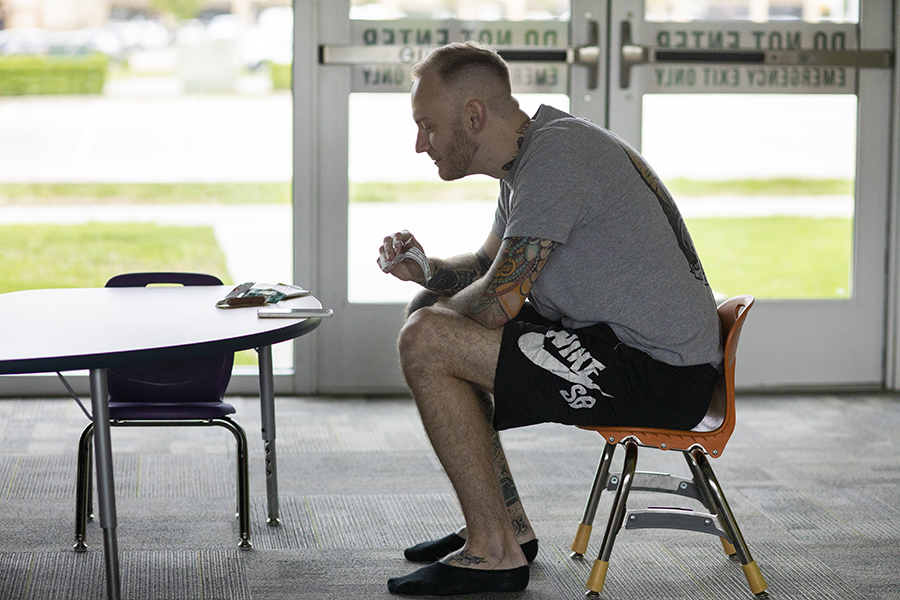
Ben takes a lunch break while checking his phone for messages from listeners.
Over time, he realized the why behind a lot of his struggles. He says his addiction was a way to survive — survive loneliness, depression, anxiety and the bullying he experienced for his faith. With this realization about his conflicts within and the deeper unmet longings he had, Ben found freedom in Jesus and safe relationships with friends and mentors. And like Cameron, Ben wants to help others experience freedom as well.
Ben is passionate about the life of Jesus, particularly because as Jesus encountered people, He would bring salvation but also healing to them. Ben desires to see a spiritual revival happen among young people and believes that addiction, mental health struggles and hurt are the areas that Jesus wants to engage them in.
“The emotional wrestlings of Gen Z are opportunities to engage with people and show them Christ,” Ben says. He wants to spread the message of the freedom, healing and hope he found in Jesus through biblical, neuroscientific and psychological solutions.
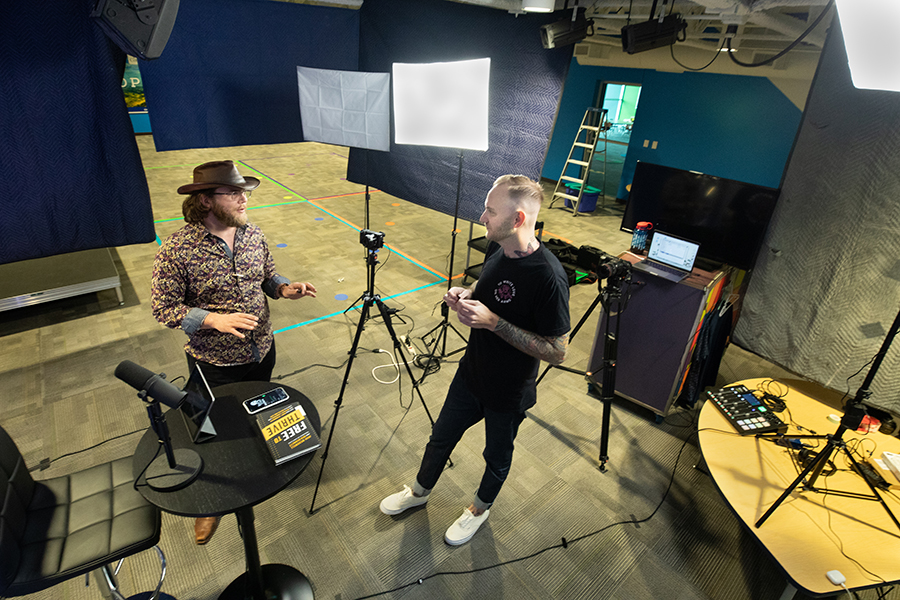
Ben talks with Austin Woodruff, a colleague, who helps him with recordings.
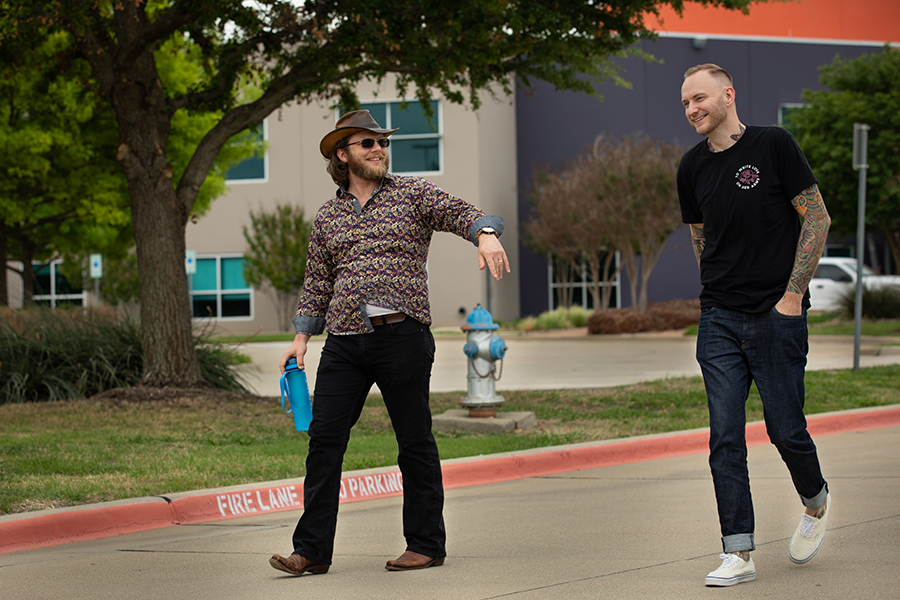
Between recording sessions, Ben walks with Austin down Dallas streets near the studio.
The story behind the movement
Ben Bennett shared the ministry was named “Resolution Movement” to give a “re-solution” for this generation with answers to spiritual questions and help bring biblical and holistic solutions to people’s hurts and struggles based in neuroscience and research. Rather than only trying to fight the struggle, experiencing wholeness includes looking beyond to discover the deeper longing of the person’s heart. “This involves helping people understand that their struggles aren’t random but are signals of a deeper God-given longing that He wants to engage,” Ben said.
Ben spent three years meeting with neuroscientists, therapists, pastors, and individuals from Gen Z. They learned significant ways to help Gen Z experience wholeness and know Jesus. “We discovered profound biblically-based and research-informed solutions to people’s hurts and struggles,” said Ben. “I’m stoked that Jesus has been using these discoveries through our messaging to bring the gospel, healing, and thriving to hundreds of thousands around the globe!”

Sean McDowell, an awarded teacher and popular national youth speaker, joins Ben for an interview in one of Ben’s podcasts.
Experiencing isolation, loneliness, depression and anxiety have been predominant characteristics of Gen Z. The COVID-19 pandemic heightened these issues along with increased feelings of hurt and pain caused by isolation. According to Barna Research, one out of four Gen Zers has considered suicide this past year.
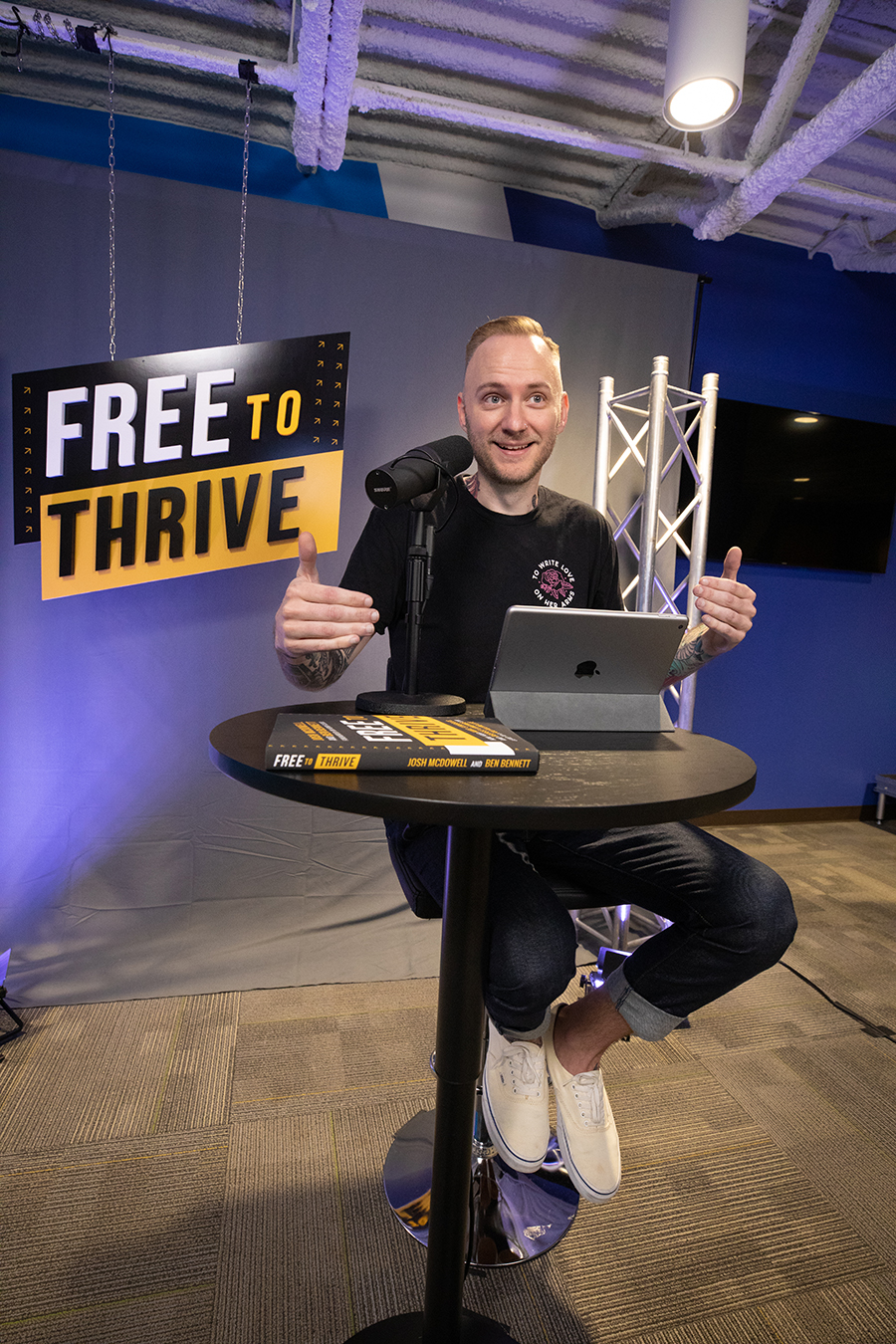
Ben films for his podcasts and talks about longings from his book, Free to Thrive.
“The Wholeness Apologetic Model of Resolution Movement explores how God has designed people to heal from hurt, overcome struggles, know God personally, and start thriving here and now as we live into His design,” Ben said.
Understanding the generation
Generation Z includes individuals born after 1997. According to Barna Research, Gen Zers, also called “Screenagers” spend five to six hours daily on smartphones. Screen use can be beneficial, but it can also create a coping mechanism or become a cause of anxiety for people.
Gen Zers are self-aware of feelings and thoughts and are open to discussing them.
Gen Zers are comfortable disagreeing with others, but have trouble expressing their feelings of disagreement. They do not want to be perceived as judgmental and they fear being ostracized.
For Gen Z, there is a hyper personalization of reality caused by marketing for their desires and preferences, which is related to the digital and social media impact of the smartphone and other similar devices. Companies and individuals tailor to your preferences of playlists, food, and even which ads are frequently seen. This relativistic thinking can cross over into areas including morality, spirituality and sexuality. With everything personalized, there is excessive individualism and a scripting of reality. As a result, Gen Zers think they can reach God through multiple ways.
Cameron says that Gen Z has a blank slate when it comes to religion. “From my experience, they don’t hold a specific worldview. They are unsure about what they believe,” he says. Some parents have not told their children anything about religion and they don’t talk about it in the home.
Cameron teaches sixth grade at a primary school and finds that the students don’t know anything about the Bible or who Jesus is.
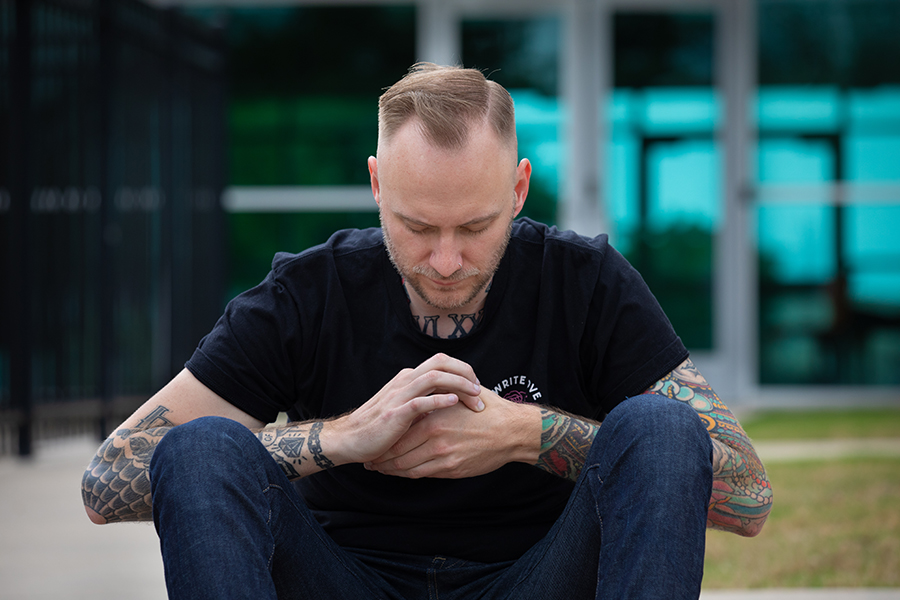
Applying pressure to his body’s pressure points, along with breathing techniques and talking to God, helps Ben relax for videos.
Ben says overcoming and thriving is a journey. It starts with meeting Jesus and knowing Him personally. “Many struggle to deeply believe that God loves them, forgives them, and delights in them no matter what. It’s crucial that people learn who God truly is and also see Him as their heavenly Father who loves and cares for them.”
Gen Z leans into older generations for input, including, parents, adults or grandparents.
Cameron feels that intergenerational mentors are an essential need of Generation Z. “I wish that I could have had someone older to mentor me from grade 7 to 12 and even in college,” he said. One way to meet the needs of a Gen Zer, Cameron says, is by having someone who listens to their story, doesn’t give unsolicited advice, and is willing to walk life’s journey together.
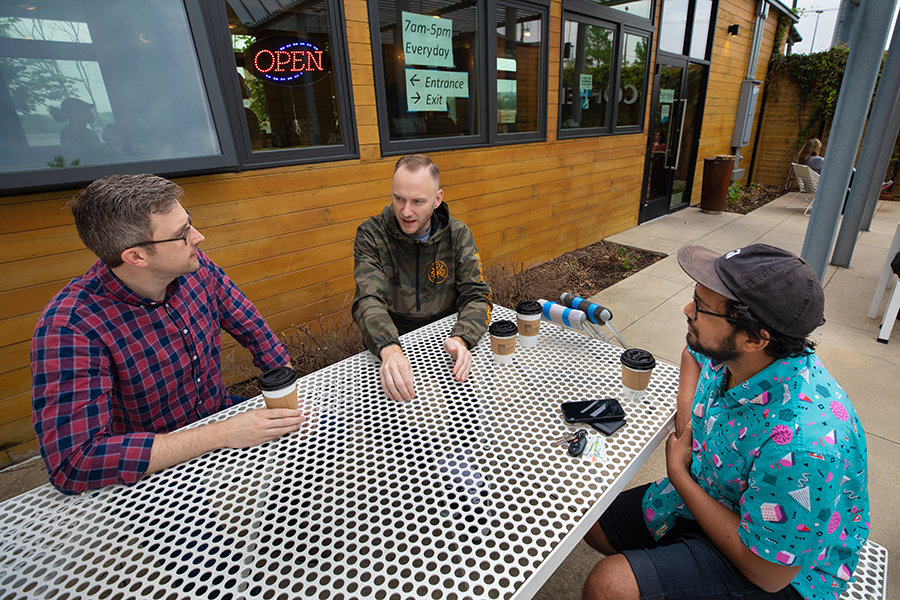
Thomas Ainsworth (left), Ben and Johnny Subash (right), close Christian friends, meet two or three times a week, sometimes at a Dallas coffee shop.

Johnny Subash, Ben’s close friend, says, “Resolution Movement is a good thing for unmet needs, taking an original, fresh approach to reach people in a new way.”
Cameron suggests showing interest in Gen Zers by simply asking how their day went and discussing school-related topics.

At the studio, Ben discusses his new book, Free to Thrive. The book examines the signals that anxiety, doubt and shame present and how to understand these struggles and move towards a thriving life.
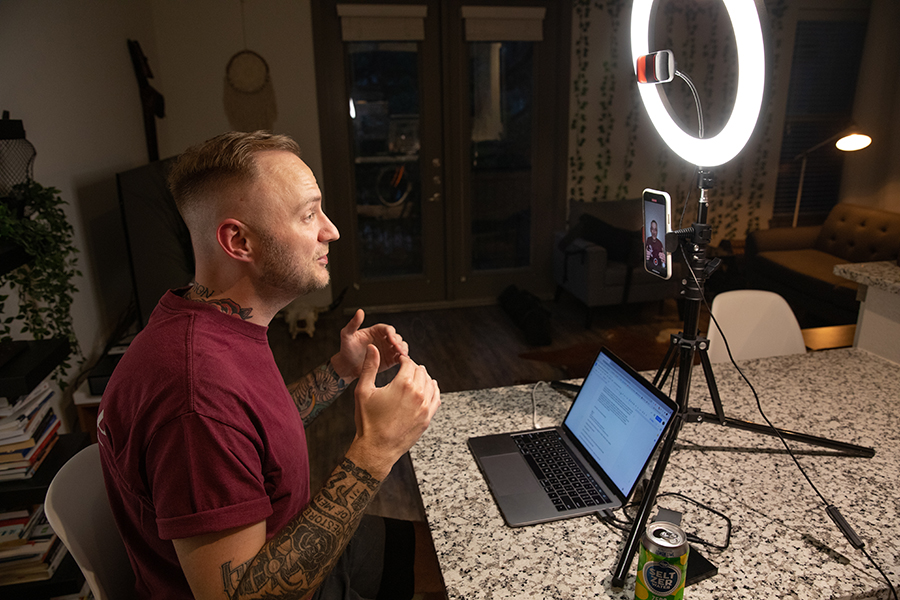
At home, Ben makes 30- to 60-second-long TikTok recordings.

In the evening, Ben checks replies and interacts with Gen Zers from his TikTok account.
A few tips for ministry
According to Sean McDowell and Jonathan Morrow, during a conversation they hosted on YouTube using Barna Research, when talking with a person from Gen Z about their emotional life, consider asking, “On a scale of 1-10, how would you rate your mental health?” Speak into them words of hope, such as “You can make a difference,” “There is hope” and “There’s a way to contribute to society.”
When Gen Zers are talking about spiritual topics, help them find a foundation for clear thinking on what is true and moral, and who Jesus claimed to be.
When struggling with identity, speak words of identity over them, for example: “Because you are made in God’s image, you are valuable,” or “Because you’ve been forgiven in Christ, you are now free to obey,” or “This is not a conditional love that God loves you more if you obey, but God loves you, so now you can obey.”
When a Gen Zer struggles with rebellion, tell them you love them and want to pray for them. Seek to understand their feelings and ask them to tell you more. For example, “Tell me how things are going in your life. Has anyone disappointed you recently?”
The topics of porn addiction, game addiction and mental health struggles need to be addressed with youth and brought out into the open. Ask, “How do you feel, or what do you think, about gaming? Is there a draw to game more often than you want to? Do you find it fulfilling? How do you feel about the subject of pornography and why?”
Ben recently received a direct message on Instagram from a teen, who then placed his faith in Jesus. Ben pointed him to the “How to Know God” page on Cru.org. Another young man recently asked for prayer after his girlfriend died by suicide the previous night. These are two examples of several conversations Ben has weekly on social media as Jesus brings hope, salvation and freedom to others.
To learn more about Resolution Movement’s social media, and to check out some of Ben’s ministry, visit him on Instagram, TikTok and Facebook.

In Dallas, Ben unwinds on his skateboard.
“Vigilant” is a 15-minute film with a discussion guide.
Ben showed Vigilant to a group of five guys who were in ninth and 10th grade. They looked for themes behind the main character’s struggles, hurts, and rejection he faced growing up, addressed the compulsive behavior used to cope, and came to the conclusion you need God and others to overcome things.
Made to Thrive is an evangelism tool to reach Gen Z, presenting God’s desire to reconnect people to himself. Because Gen Zers want to know how the Christian worldview changes life today, not just in the next life, this user-friendly tool shows them how they can know Jesus personally and thrive.
“Free to Thrive: How Your Hurt, Struggles, and Deepest Longings Can Lead to a Fulfilling Life”, a book Ben Bennett cowrote, identifies unfulfilled God-given longings that people seek to fulfill through unhealthy behaviors. Ben says, “I recommend ‘Free to Thrive,’ to heal, to understand how to overcome struggles, but then to have a much more meaningful life with God and others.” These principles can lead readers from brokenness to wholeness to have the kind of life they were born to live.
Familiarize yourself with Resolution Movement podcast content. Use Resolution Movement as a platform. Send podcast episodes to family members. Invest in one-on-one relationships with youth at church. And spread the word about Resolution Movement.

Jan serves as a journalist with Cru®. She has had an interest in creative writing ever since her high school newspaper column days. She hopes to inspire hearts toward Christ.
Contact Me
Guy isn’t much of a city person. Paddling down the Wda river in northern Poland with participants of a Cru® summer mission project describes a great place for him to photograph. He likes being outside, doing anything with water, and he enjoys making things with his hands. Guy serves as a photographer for Cru.
Contact Me